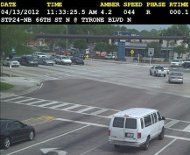2/7/2013
Florida City Caught Issuing 1645 Camera Tickets On Shortened YellowSt. Petersburg, Florida issues $259,910 worth of red light camera tickets at intersections where yellow was up to 1 second too short.

A tenth of a second can make a big difference. In St. Petersburg, Florida, the yellow time at intersections was shortened by fractions of a second for thousands of drivers, enabling the red light camera program to generate an extra $259,910 in revenue in 13 months. To the unaided eye, the difference between a 4.3 second yellow and a 4.2 second yellow is too brief to be perceived, but it was enough to boost the number of citations issued by five percent.
The short-changing would have gone completely unnoticed had the StPeteCameras.org website not obtained an unusually comprehensive database of red light camera ticket data from American Traffic Solutions, the Arizona-based company in charge of citations. Matt Florell, the website's proprietor, intends to present his findings to the city council at a meeting this morning.
"What I did next is run a query in my database looking for citations issued to people where the yellow signal time was shorter than the city claims it was supposed to be," Florell said in an email. "I took those citations and looked at the red light time compared to how short the yellow light was from what it should be set to as claimed by the city. I found 1645 citations where the person would not have run the red light if the yellow signal had been for the proper length of time. That's over a quarter of a million dollars in citations sent out to people who only ran the red light because the yellow light was too short."
The data show at seven city intersections, the yellow time dropped between 0.1 and 1.1 seconds for some tickets from the date the cameras started ticketing October 29, 2011 through November 30, 2012 (view chart of short yellow violations). The database proved accurate when Florell requested the video of a motorist ticketed on April 13, 2012 at the intersection of 66th Street and Tyrone Boulevard. According to city documents, that location should have a 4.3 second yellow. The ATS system recorded the yellow only lasting 4.2 seconds that day, and the motorist was ticketed for entering the intersection 0.1 seconds too late. Video evidence shows his wheels touching the stop line just as the light changed (view video on YouTube). The vehicle owner would not have received a citation had the signal timing been correct.
St. Petersburg depends heavily on split-second timing misjudgment. The city generated 45 percent of its revenue -- $2,128,576 -- from tickets generated in a half-second or less after the light turns red. In the first three-tenths of a second, which is less than a blink of an eye, 31 percent of the city's tickets were issued.


